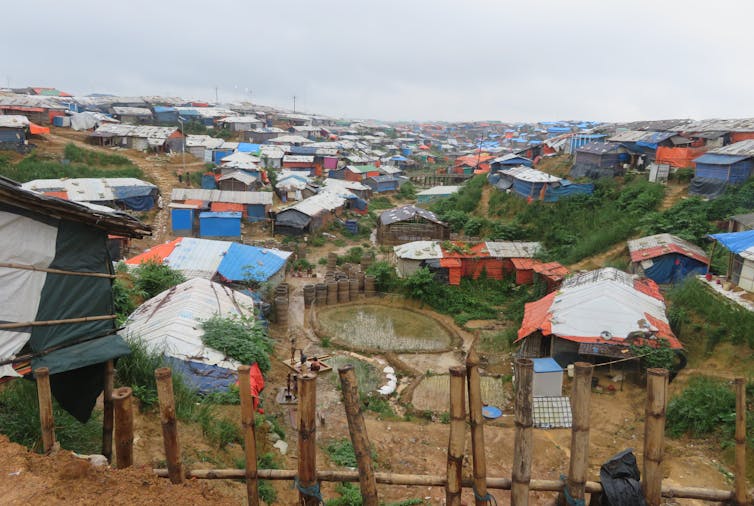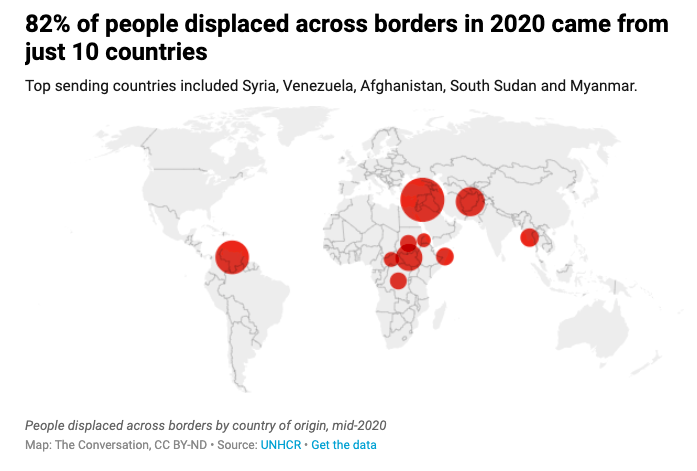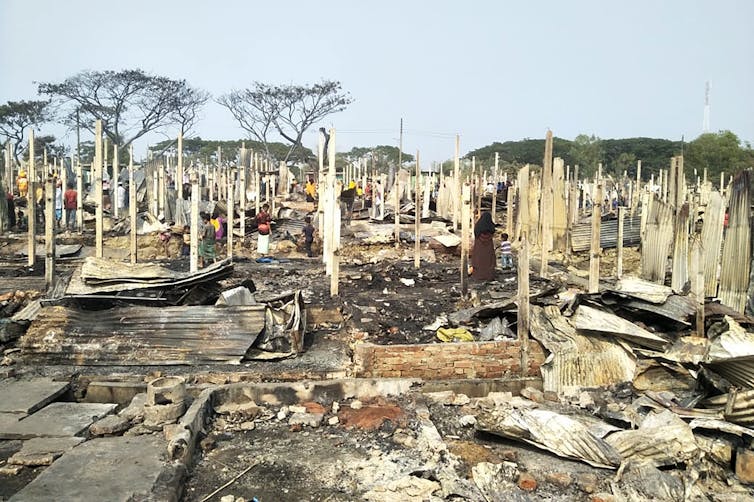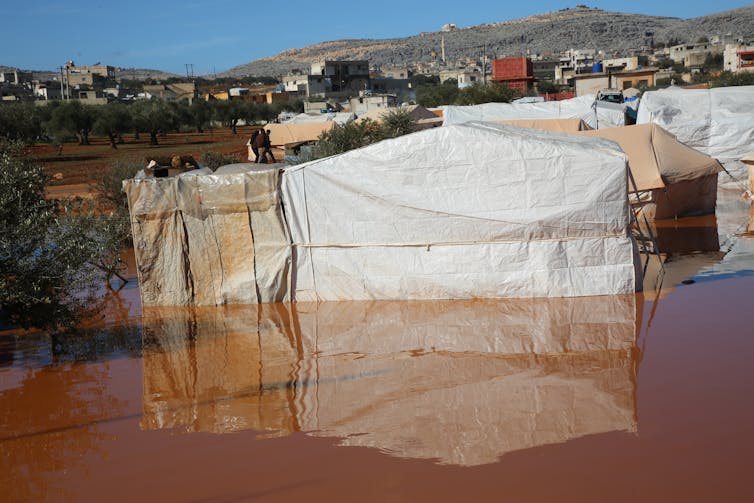
Leonard Hammer, University of Arizona and Saleh Ahmed, Boise State University
*This article is reprinted from The Conversation, a nonprofit news site that features research and opinion pieces authored by expert faculty from around the world – including experts at Boise State, like the piece below. Please note: opinion pieces authored by Boise State faculty do not necessarily reflect the views of the institution.
While it may seem that much of the world has been locked down during the past pandemic year, more than 80 million people are currently on the move – unwillingly.
Facing conflict in Syria, human rights violations in Myanmar and violence in Eritrea, among other hot spots, refugees are trying to relocate to North America and Western Europe, or at least to neighboring countries.
Large camps of displaced persons can wreak major environmental damage. Refugees use and pollute water, deplete wood supplies for fuel, and poach animals for food, often harming parks, nature reserves and World Heritage Sites. These impacts make host countries less willing to receive more refugees.
International law offers refugees only limited protection. Mainly, it bars forcing them to return to the places where they were persecuted. It is quite difficult for refugees to attain adequate redress or relief.
We study international law and the human dimensions of global environmental change. Our research on the environmental calamity caused by over 1 million Rohingya refugees fleeing from Myanmar into Bangladesh has convinced us that a new angle is worth considering.
We believe that countries offering safe harbor to refugees should have a legal option to sue the sending country for environmental damages. Such payments would help pay for some of the impacts of housing thousands of displaced persons, and could even provide some direct support to the refugees for their living costs.

Refugees strain resources
Imagine a million homeless people suddenly moving to your region without jobs, money, food or belongings. They would have myriad needs, starting with clean water, toilets, health care and food.
This is the situation in Bangladesh, where over 1 million displaced Rohingya have fled since August 2017 to escape violence in their home country, Myanmar. The resulting environmental damage in Bangladesh is unprecedented and massive.
Temporary makeshift housing for Rohingya has destroyed at least 3,713 acres of critical reserve forests as refugees cut trees for housing and fuel. As a result, soil erosion has increased dramatically. More than 100 tons of human waste and garbage has polluted canals and waterways, severely degrading local air quality. Camps have been constructed in areas that are habitat for Asian elephants, leading to clashes between humans and these endangered animals.
The limits of international law
Under current international law, a sending state that causes people to run away does not typically bear any financial responsibility. We believe it is time to hold governments that cause massive exoduses accountable for human and financial losses.

There are strong historical grounds for holding the sending state responsible for environment damage. In the Trails Smelter Arbitration of 1938 and 1941, the U.S. successfully sued Canada for pollution damages caused by a smelting factory near the border. The Canadian company had to cease operations because its factory emitted harmful fumes, and it was required to pay for the damages it caused.
This case established a principle called the “no-harm rule,” which dictates that a state has a strict obligation not to cause environmental harm in another state. Today the no-harm rule reflects customary international law – a set of international rules that all states accept as binding and are obligated to uphold.
Like fumes from a factory, refugees can cross international borders as they flee from persecution. The sending state caused them to flee, and could have prevented their exodus from happening. The receiving state presumably has not consented to a huge influx of displaced people that causes severe environmental damage.
A state can rely on customary international law to bring a cause of action against another state, and make use of international bodies like the United Nations to engage the process and involve international actors and organizations. States can also invoke principles of customary international law in international courts, such as the International Court of Justice and the International Criminal Court.
The International Court of Justice, for example, relied on the no-harm rule both in its 1996 Advisory Opinion Regarding the Threat or Use of Nuclear Weapons and a 1997 dispute between Hungary and Slovakia over a hydroelectric dam on the Danube River.

The human right to a clean environment
International law does recognize that governments have a duty to protect and preserve the environment, and to provide stable and suitable places for all people. States have begun to codify this responsibility in treaties like the Arab Charter on Human Rights, the American Convention of Human Rights and the African Charter on Human and Peoples’ Rights.
The Council of Europe also has recognized the right to a clean and healthy environment. Court decisions under the European Convention on Human Rights and Fundamental Freedoms have relied on the right to life, the right to health and the right to privacy and family life to uphold a right to a clean environment.
More than 100 states have already codified the right to a clean environment in their constitutions. Recent lawsuits against states include one against Indonesia for unhealthy air quality in Jakarta and another against the Brazilian government filed by a number of opposition parties for not adequately protecting the environment, including healthy biodiversity and a safe climate in the Amazon rainforest.
The United Nations’ Special Rapporteur on human rights and the environment created the Framework Principles on Human Rights and the Environment in 2018. This document affirms that states should work together to prevent global environmental harm and to protect vulnerable groups.
Bangladesh could challenge Myanmar in court
Based on these principles and precedents, we believe that Bangladesh has a strong legal foundation to challenge Myanmar for environmental damages. The impacts on Bangladesh of accepting huge numbers of Rohingya can be calculated and presented in court.
The right to a clean environment also can prevent states from creating forced massive human displacement in the future.
Bangladesh can demonstrate that Myanmar bears responsibility for environmental damages because Myanmar’s persecution of the Rohingya caused them to flee, and it can claim costs involved in caring for them. Long recognized as one of the world’s most environmentally vulnerable countries, Bangladesh needs to avoid further environmental damage as it provides basic needs for the Rohingya population.

In our view, the very land that displaced people occupy can help them and their hosts find relief under the law.
Leonard Hammer, Director of Outreach and Development, Human Rights Practice Graduate Programs, University of Arizona and Saleh Ahmed, Assistant Professor, School of Public Service, Boise State University
This article is republished from The Conversation under a Creative Commons license. Read the original article and find more articles from Boise State University faculty published in The Conversation.
[Over 100,000 readers rely on The Conversation’s newsletter to understand the world. Sign up today.]